One Night, Hot Springs is a visual novel centering around a trans woman in Japan’s experience of going to the hot springs with her friends. By making the player choose the most important decisions in the game, the developers are able to build empathy for trans women and enhance the agency of trans women.
The core mechanic of most visual novels is the ability to make decisions for the characters that impact the path of the narrative as well as how it concludes. This is the core mechanic of the gameplay of One Night, Hot Springs as well. Very early on, I was given the choice of how Haru, the main character, should respond to the hot springs invitation.


It’s simple, but the act of making a choice for her forced me to consider things from her perspective and put myself in her shoes. Though at the time I didn’t know she was trans, Haru expresses discomfort towards the idea. Later on, after arriving at the hot springs, Haru indicates that her legal gender is currently Male and is subsequently deadnamed by the receptionist since she hasn’t been able to change her legal name yet. Once again, the player is asked to respond to this situation with a choice.
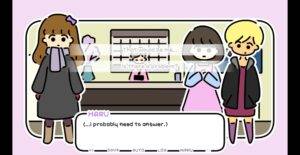
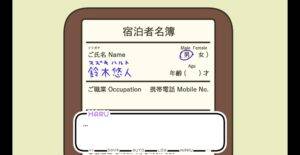
It is one thing to know about the phenomenon of deadnaming, but it is another thing entirely to experience it. It is something that I have never experienced personally. And while I wouldn’t say this game has let me personally experience it, it has at least given me a microcosm of what an actual trans person might experience with it and how they would consider responding. It’s in this way that the game successfully builds empathy for a marginalized group of society that I may otherwise not fully think about or consider.
A major character in the game is Erika, who I would describe as well meaning but somewhat ignorant towards Haru’s trouble. I believe the devs included this character to be somewhat of an audience surrogate for those players who are not transgender such as myself. Her inclusion offers the audience a chance to see what they might look like from the eyes of a transgender person.
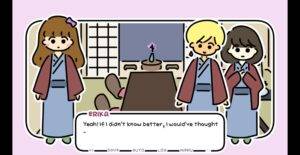

Erika also asks Haru about her experience and once again the player gets to respond. For this choice, I ended up putting myself out of Haru’s shoes more than other ones and decided to elect to speak with Erika because I shared Erika’s desire to learn more. The game offered me a chance to learn more without pushing for answers from a transgender person in real life. This was a good choice as the conversation Haru and Erika proceeded to have was actually quite enlightening for me. I didn’t know the rules about changing legal gender in Japan that Haru talks about in this conversation so it was an actual learning experience.
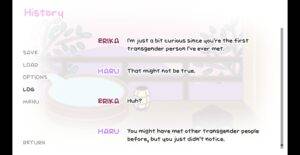
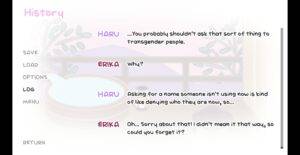
The conversation with Eirka also helps Haru to open up and talk about her experiences of feeling like she doesn’t have a place to belong, to which Erika reveals her own experiences being bullied and potentially bisexual and how she’s also felt a lack of belonging. It was nice to see the two characters bond and I was able to empathize with queer people despite not being one myself. I was surprised to hear about Erika’s experience as it made me realize I assumed she was simply a straight cis woman with no trouble belonging or fitting in. It made me realize how I can sometimes be just as ignorant as she was portrayed to be sometimes.


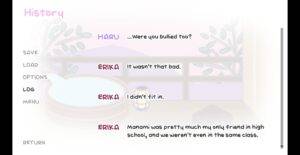
I think for a transgender person, playing this game would serve a different purpose of building agency for oneself. The struggles Haru has with asserting herself throughout the story are probably similar to real struggles, and by being able to make choices for her and force her to utilize her agency, it may give people in real life the courage and push they need to be able to take more agency for themselves. It also helped open my own eyes to their struggles and problems which can help me be an actual ally. Overall, I think without even consciously trying to, by making me make choices from the perspective of a trans woman, the devs made me emphasize with them and truly made me play the game like a feminist.
Discussion Question: How can the games industry continue to embody and incorporate the perspectives and experiences of marginalized groups of society? How can games and their mechanics be designed to fully allow others to grow empathy and understanding with these groups of society?


